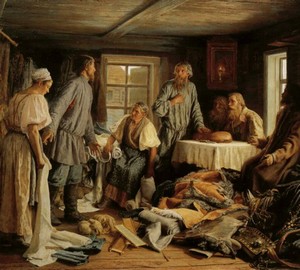“Family section”, Maximov – description of the painting

Description of the picture:
Home section – Vasily Maximovich Maximov. Canvas, oil. 100 40 eight x 100 6 cm
Vasily Maksimovich Maksimov is a recognizable Russian painter, an ascetic, a realist who devoted his whole life to the peasant genre. He possessed the deepest knowledge of village life, since he himself came from an ordinary family of farmers. He is familiar with the youth of their way of life, rituals and way of life. The picture “Family section” very close to reality indicates the difficult moment of the division of not only property, but also family.
From the very first glance on the canvas you feel all the passions that occur during the division of property between 2 brothers. Yes, this happened and is happening in any society, at any time. But the moment captured by Maximov occurs in a difficult period of the late 19th century. After the abolition of serfdom, the patriarchal way of life of the village, built up over years, begins to change. Once friendly peasant communities and families break up, unable to withstand new changes and problems.
Before us is such a family. Upon careful examination, you understand that this is not even a divide, but the robbery of a younger brother by an older one. Clothes, fur coats, fabrics, horse harness details and many other things are dumped throughout the room.
The elder daughter-in-law is simply the embodiment of malice and greed. She spread her arms and even pressed a piece of some canvas with her foot in order to grab more things and simple farm utensils.
In contrast, her younger daughter-in-law, distracted and defenseless. He and his spouse got a kettle and a couple of rolls of fabric. Because of the snow-white canvas that in her hands, it seems, the last argument has flared up.
Some relatives are here, but they are on the sidelines, they are no longer trying to reconcile the parties. In the reddish corner, the artist depicts an icon with a burning candle. Perhaps the creator wanted to direct the attention of the arguing to the fact that you need to be kinder, show mercy, and not humiliate your neighbors. But all this is in vain. Thirst for profit and self-interest are stronger. The section has already ended.
The work saturated with feelings received a great response in the creative environment, it was appropriately appreciated by contemporaries."